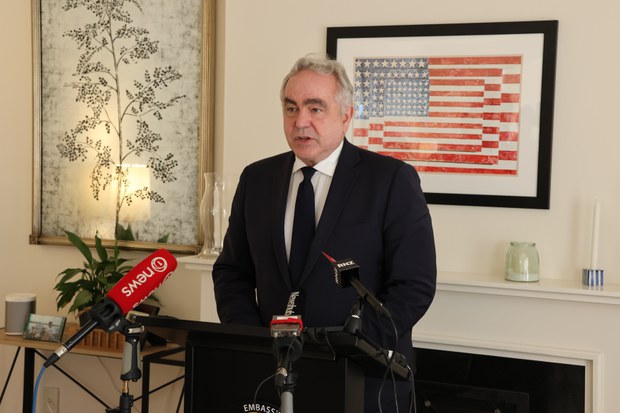At start of Pacific tour, senior American official underscores Solomon Islands-China concerns
2023.03.18
Wellington
 Kurt Campbell, the U.S. National Security Council’s Indo-Pacific coordinator, speaks during a press conference at the residence of the U.S. deputy chief of mission in Wellington, New Zealand, March 19, 2023.
Kurt Campbell, the U.S. National Security Council’s Indo-Pacific coordinator, speaks during a press conference at the residence of the U.S. deputy chief of mission in Wellington, New Zealand, March 19, 2023.
A senior White House official on Sunday underlined U.S. concerns about China’s close ties with the Solomon Islands as he began a weeklong tour of Pacific island countries.
Kurt Campbell, the U.S. National Security Council’s coordinator for Indo-Pacific affairs, stopped in New Zealand during the weekend before heading to the Cook Islands, Papua New Guinea, Fiji, Vanuatu and the Solomon Islands.
“We’ve quietly underscored that there are a few areas that we would have concerns by, if for instance, the Solomons chose to work in a manner that would encourage or support military power projection in the region,” Campbell said at a press conference in Wellington, New Zealand’s capital.
His tour comes on the heels of a Chinese special envoy’s dash through the region.
The delegation led by Campbell includes officials from the State Department, USAID, the Coast Guard and the Department of Defense.
“We think those steps would be unwelcome not just to the United States but to other countries in the Indo-Pacific,” he said, referring to China and the Solomon Islands. “We’re working closely with all the countries in the Pacific. We recognize the challenges, but we’re here to continue the dialogue.”
Campbell’s trip is part of ongoing efforts by the Biden administration to improve U.S. relations with Pacific island countries in a region where China has emerged as an alternative source of aid, infrastructure funds and trade.
Beijing’s relations with the Solomon Islands in particular have burgeoned after the Pacific island country switched its diplomatic recognition to China from Taiwan in 2019. Last year, China and the Solomon Islands signed a security pact, the scope and obligations of which remain unclear as neither has released the text of the agreement.
Campbell said the United States was “very grateful” that the Solomon Islands took part in President Joe Biden’s summit with Pacific island leaders in Washington last year.
“We’ve had subsequent high-level interactions in a range of areas. I’m here to discuss … our desire to maintain close relations with the Solomons,” he said.
Campbell’s tour follows last week’s announcement by the leaders of Australia, United Kingdom and the United States that Australia would buy U.S. nuclear-powered submarines in the early 2030s and build its own nuclear subs by the following decade using British and American technology.
The so-called AUKUS pact, analysts say, is squarely aimed at China, which has doubled its annual military spending in the past decade though it still spends far less than the United States does on its armed forces.
China’s recently appointed envoy for Pacific island countries affairs, Qian Bo, also has visited the Pacific lately. Earlier this month he traveled to the Federated States of Micronesia, Papua New Guinea and Vanuatu.
After Qian’s visit to Vanuatu, the secretariat of the Vanuatu-based Melanesian Spearhead Group – a forum of Fiji, Papua New Guinea, the Solomon Islands, Vanuatu and the Kanak independence movement in New Caledonia – said it was considering a security and development cooperation agreement with China.
Qian’s Micronesia visit ended with discord. He said he had cordial discussions with Micronesia’s President David Panuelo. However, Panuelo’s spokesman told BenarNews that no meeting had taken place between the two.
Subsequently, a leaked letter from Panuelo to Micronesian lawmakers accused Beijing of trying to undermine Micronesia’s sovereignty and called for the country to cut ties with China and recognize Taiwan.
American involvement in the Pacific diminished after the Soviet Union broke up in 1991, with a reduction in embassies and U.S. development assistance through its Peace Corps agency.
Earlier this week, U.S. Indo-Pacific military commander Adm. John Aquilino told an event in Singapore that relations with Pacific island countries were back on track. He also said China’s inroads with the Solomon Islands had been a wake-up call for U.S. officials.
Campbell’s assessment appeared more cautious.
“We realize that we have to overcome in certain areas some amounts of distrust and uncertainty about follow through,” he told reporters in Wellington on Sunday.
“We’re seeking to gain that trust and confidence as we go forward,” Campbell said. “Much of what we are doing has been initiated by the president, but I want to underscore that it’s quite bipartisan.”







